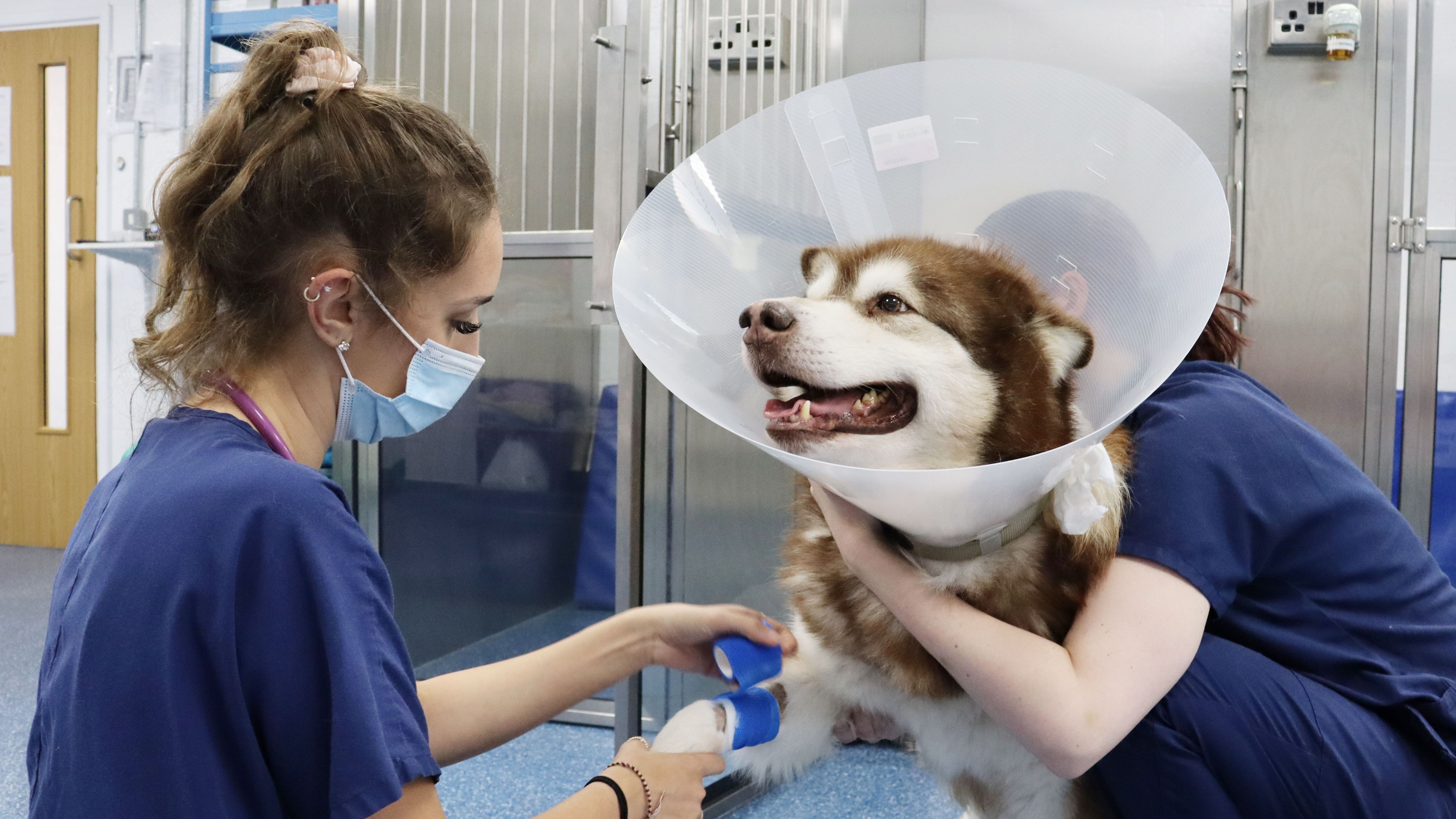
When is it a pet emergency?
Signs your pet needs urgent veterinary care

It is important to know when your pet requires immediate veterinary attention from a veterinary professional. Some problems can be more serious than they outwardly appear and may require prompt treatment to prevent them worsening, while others are true emergencies that require veterinary care as soon as possible. In this article we discuss some of the most common reasons pets need emergency care – but remember, this isn’t a complete or exhaustive list. If you’re ever unsure whether your pet needs urgent help, it’s always best to contact your vet straight away.

Common signs of pet emergencies to watch for
Breathing difficulties and choking
This can be obvious signs like choking and gasping, but can also include more subtle signs, such as breathing with more effort (often seen as excessive abdominal movement), breathing quickly, or open-mouth breathing/panting in cats (panting is normal for most dogs).
Inability to urinate
Straining a lot without with little or no urine can be a sign of a urinary blockage, especially in male cats and dogs. The same symptoms in female pets are usually a sign of cystitis, which needs veterinary care but is generally not an emergency.
Severe or Uncontrolled Bleeding
Not all bleeding is an emergency, but a constant flow of blood, bleeding that pulses, or bleeding that does not stop within a few minutes should all prompt veterinary attention.
Eye Injuries and Emergencies
Some eye conditions are considered an emergency and can include corneal ulceration, glaucoma (noticed as the surface of the eye going blue/cloudy), eye trauma, swelling or prolapse of the eye, and sudden onset blindness (often related to high blood-pressure). The eye is a delicate structure that can quickly get worse.
Vomiting and Diarrhoea: When to Worry
Vomiting or having diarrhoea multiple times per day, or if these symptoms are accompanied by other signs of illness, such as fever or lethargy.
Bloat or twisted stomach
Retching or trying to vomit but either producing nothing or only a small amount of mucus can be a sign of gastric dilation and torsion (bloat) in dogs. You might also see the tummy become bigger and feel hard. This is an emergency and requires immediate veterinary attention.
Trauma - broken bone / road traffic accident / burns
Don’t wait to bring your pet in if they have been attacked by another animal or hit by a car or other object, even if there are no visible signs of injury. Internal injuries and bleeding can quickly become life-threatening. Previously undiagnosed seizures can be another sign of trauma.
Collapse and weakness
Collapse is an inability to stand up or move around normally. Pets can collapse for many reasons, including physical problems with the back legs or the spine, or systemic (related to the internal body system) problems such as low blood pressure due to internal bleeding, or overheating as in heatstroke. Collapse usually requires urgent veterinary attention to find the underlying cause.
Poisoning and Toxic Ingestion
If your pet ingests a known toxin or exhibits symptoms like vomiting, diarrhoea, seizures, difficulty breathing, or collapse. Time is critical, and prompt veterinary attention can be lifesaving.
Birthing issues
In pets, a birthing emergency arises when a dog or cat experiences difficult labour (dystocia), which requires immediate veterinary intervention. Key indicators include straining for over 20-30 minutes without producing a puppy or kitten, more than two hours between deliveries, or abnormal discharge (green or bloody) without delivery.
Seizures
Any seizure that has not stopped after 3 minutes or several short seizures within a short period, warrants immediate veterinary treatment. A single, short seizure does not require urgent treatment (pets are often best left where they are to recover), but we would recommend calling for advice.
Neurological (nerve or brain) problems
A neurological emergency in pets requires immediate veterinary attention with sudden paralysis or significant weakness of one or more than one limb; loss of consciousness (like fainting or coma); or severe changes in mental status like lethargy, disorientation or unresponsiveness; head tilting, circling, incoordination, or unusual eye movements (like nystagmus). These signs can indicate a serious underlying issue like stroke, brain injury, or spinal cord damage.
Stings/bites/allergic reactions
A sting, bite, or allergic reaction is a medical emergency in pets if they exhibit signs of difficulty breathing, swelling, or collapse (anaphylaxis). Other signs of a serious allergic reaction include vomiting, pale gums, disorientation, or seizures - contact your vet immediately.
Heat stroke: a veterinary emergency
A pet with heatstroke is a medical emergency requiring immediate attention. It occurs when a pet's body temperature rises above 40°C, excessive panting, difficulty in breathing, red gums, drooling, restlessness and agitation, vomiting and diarrhoea, collapse and weakness and if left untreated, can lead to organ failure, coma, and even death.

What to do if your pet is experiencing an emergency
Pets can experience a range of emergencies that require immediate veterinary attention, even if the symptoms don’t always seem obvious at first. From breathing difficulties and severe bleeding to seizures, poisoning, or signs of bloat, quick action can make all the difference. Understanding these common emergency signs helps you respond promptly to protect your pet’s health and well-being. When in doubt, it’s always best to contact your vet straight away.
When in doubt, contact your vet immediately
Learn the signs of a pet emergency and when to contact your vet immediately. It’s important to know your nearest 24/7 vet clinic before an emergency happens.
Animal Trust provides 24/7 emergency care at our Pet A&E centres in Barnsley, Bolton, Ellesmere Port, and Shrewsbury. Find out more about Animal Trust's emergency services here.
Written by Dr. Mariella Roberts, Veterinary Surgeon, Animal Trust Vets CIC
Published September 2025 | Review date September 2028
This advice is for UK pets only and is not a replacement for seeing a vet

